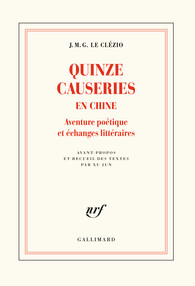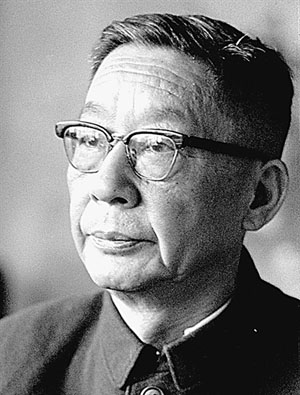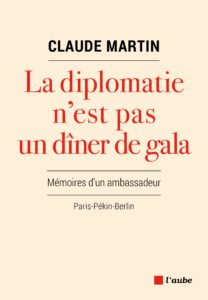
A book by Jean Marie Gustave Le Clézio has just been published, subtitled “Aventure poétique et échanges littéraires”, it is about “Quinze causeries en Chine” (1), fifteen lectures, selected by his translator and friend Xu Jun; occasional texts but also essays of a very high quality.
Xu Jun translated “Desert” in 1983 and then nine years later “Le Procès Verbal”. They then met in Nanjing, during a visit of Le Clézio and his wife Jemia, invited by the French ambassador Claude Martin.
In his preface, Xu Jun, depicts an author who is in love with justice and humanity, who is constantly renewing himself. A great reader who listens to others, with very diverse curiosities and a man of great simplicity.
– Fifteen talks (2011-2017):
Le Clézio has spent many long periods of time in China, notably at Nanjing University, where he is an honorary professor and heads the Sino-French Cultural Centre. His many lectures, or rather, as he says, his talks, have earned him the Friendship Award from the Chinese government.

Le Clézio is a writer of the world who takes us out of the often stuffy atmosphere of contemporary French literature. For him, the essential is interculturality, which is the key to universal peace. He regrets the ignorance of European societies towards the East and stresses the importance of globalisation. This must not be accompanied by colonial-type developments and American, European or Chinese “soft power” struggles should be avoided.
A man who lived for several years in the forest in Panama confirms this: “Literature cannot exist without the practice of interculturality… The world’s megacities are public places where ideas and ideals from all over the world meet. The crossbreeding they propose is irrefutable. (p.48).
A writer who has not travelled but has changed his home: Nice, “which has become the French capital of pensioners who are developing a kind of idle self-satisfaction coupled with an undeniable xenophobia” (p.44), then Nigeria, Mexico, Panama, then fifteen years in Albuquerque (New Mexico).
After “committed literature”, the question of the writer’s place in the city is no longer the same, “literature exercises power, a fascination, but it has not prevented anything, neither injustices, nor wars, nor depressions. Literature accompanies them, denounces them but suffers them…” (p. 34). We can imagine that even if Le Clézio is not a militant and is invited to China, the developments of recent years are probably very uncomfortable for him!
The writer lives in difficult times: “Thanks to the computer and the Internet, we know everything about the world. Irony instead of critical thinking, cynicism instead of lucidity. Vague statements have become the norm of knowledge….The greatest difficulty that culture faces on a global scale is its excessive gentleness. This blandness is dangerous because it hides the impulses of racism and xenophobia under softly coloured clothes” (p.90).
But literature has become accessible to a very large number of people and “it is undoubtedly, of all the arts, the one that translates the new world order with the most strength and conviction” (p. 167).
Le Clézio and writers in China:

First of all, the fascination for Lao She, for whom he prefaced in 1996 “Four Generations Under One Roof” (2). A long novel during the Japanese occupation of Beijing whose main character is the alley of the “Petit Bercail”, a characteristic Hutong that brings the horrors of war to life through the little people of Beijing.
He admires the universality of Lao She, which “comes from his roots, from this stubbornness that he puts into reviving the past” (p. 73). Le Clézio states: “He was a Manchu and therefore belonged to a minority that was in danger of disappearing. I consider myself to be a member of an endangered minority, that of the Franco-Mauritians” (3).
He met many writers like Yu Hua and especially Mo Yan at several conferences followed by a visit to Gaomi, the birthplace of Mo Yan in Shandong, which has become a centre for literary pilgrimages.
Several meetings with Fang Fang who we are hosting these days in Paris and especially with Bi Feiyu whose novel “Massage” (6) he admires.
Despite these talks, these contacts, the translations of his works relaunched by his Nobel Prize in 2008, some believe that he does not have the place he should have in China. A missed appointment. In the current situation, young people seek in literature “their last psychological asylum” but Le Clézio “engages in a process of deconstruction without building” (4).
The adventures of Le Clézio in China:
The author explains (p.198) that he wanted to go to China in 1966 sent by the French government, which had just opened its embassy. In his place went “a young student of Ecole Normale Supérieure” (in fact an “enarque”!) Claude Martin who had the advantage (which Le Clézio does not mention) of speaking fluent Chinese.

Twenty years later, Claude Martin, then ambassador, invited Le Clézio and Jemia to China for a long trip. In his book of Memoirs (5), he states that this period “was a real moment of happiness. Jean Marie had been my favourite author during my twenties, he remained so. I liked his look at different worlds and different people. I always kept a copy of Desert close at hand” (p. 677).
The publication of Claude Martin’s Memoirs a few months ago was an event. The title takes up a famous phrase from Mao Zedong, “The Revolution is not a gala dinner”.
This thick book teaches us a lot about France’s diplomacy towards China, about the internal struggles at the Quai d’Orsay and in the French political class. Unlike most diplomats in China, Claude Martin, married to Fei Fei, has a knowledge of the country’s language and culture and has been able to build many contacts and friendships.
In the literary field, we will not detail many encounters, but we can mention his contacts with the Nobel Prize winner Gao Xingjian in May 1979 in France in a delegation of writers led by Pa Kin. In September 1985, Gao Xingjian took refuge in France, where he was welcomed by Claude Martin who housed him in his apartment (p.499).
Bertrand Mialaret
(1) J. M. G. Le Clézio, “Quinze causeries en Chine”, Gallimard 2019, 200 pages, 19,50 euros.
(2) Lao She, “Four generations under one roof”, translated into French by Jing- Yi Xiao (for T1, by Chantal Chen-Andro for T2 and 3). Mercure de France 1996.
(3) cn.ambafrance.org/Interview with Jean-Marie-Gustave-Le-Clezio 30/11/2014
(4) Guo Lina “In search of an effective Sino-Western dialogue based on the literary defeat of Le Clézio in China”. Sun Yat-sen University 18/4/2016.
(5) Claude Martin, “La diplomatie n’est pas un dîner de gala” Editions de l’Aube, 2018, 950 pages, 29,90 euros.
(6) Bi Feiyu, « Massage », translated by H. Goldblatt and Sylvia Li-chun Lin; Penguin Books Australia, 330 pages.
e Clézio, a Nobel prize, in Nanjing and China.





